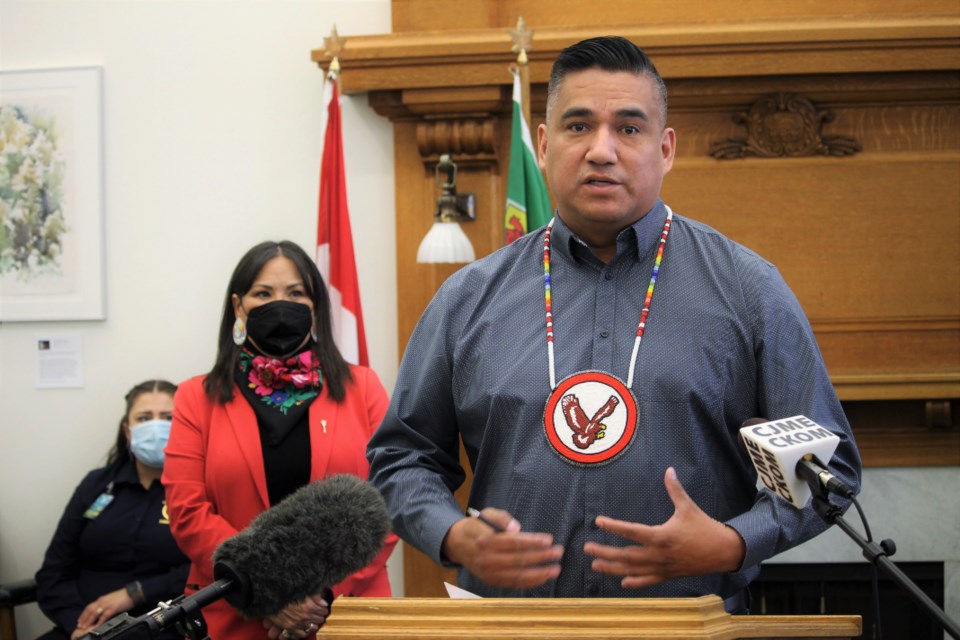REGINA — A delegation of more than 20 members of Saskatchewan First Nations communities appeared in the legislative session today, in support of a private bill to restructure Indigenous consultation in land use.
Saskatoon Centre MLA Betty Nippi-Albright, opposition critic for truth and reconciliation, presented the new bill to the house on April 13 during session. She was joined by members of George Gordon First Nation, Onion Lake Cree Nation, Birch Narrows First Nation and Kahkewistahaw First Nation in the gallery.
Nippi-Albright described the bill as the first provincial legislation of this type to be presented in Canada.
“Indigenous people are asking to have meaningful consultation,” said Nippi-Albright. “This bill is historic, first-of-its-kind legislation.”
She described the bill as seeking to better support the autonomy of Indigenous communities, by addressing systemic racism she said is baked into current government policy.
The private member’s legislation, titled Bill 609, would seek to improve government policy regarding how affected Indigenous communities are consulted in land use deals under federal requirements.
In Canada, governments are required to include impacted Indigenous communities in decisions regarding land use, including sales and industry development proposals, under the Crown’s duty to consult.
Nippi-Albright, joined by several First Nations delegates including Kahkewistahaw FN Chief Evan Taypotat, said that the current duty to consult process in Saskatchewan is flawed and insufficient.
Currently, Nippi-Albright said that the government process involves delivery of a registered letter or one meeting with Indigenous representatives prior to decisions.
“Current duty to consult policies are not meaningful and do not honour the Treaty rights of Indigenous Peoples,” said Nippi-Albright. “[The] process that is in place now, since 2010, is broken. It doesn’t work.”
Taypotat, who attended Wednesday’s session in support of Bill 609, said that the process's minimal action is leaving Indigenous communities out of decisions regarding the land they live on and near.
“We feel we are 30 years behind other provincial jurisdictions [like] British Columbia,” said Taypotat.
He and other Indigenous leaders are seeking a more involved process that engages more fully with the community, on the same level as industry corporations and investors.
“We are asking people to help us help ourselves, instead of helping other places the money goes in capitalist [structure],” said Taypotat. “We don't want a hand out — we want a hand up.”
Bill 609, if passed, would improve existing processes, while also flipping the onus to see Indigenous communities decide how consultation would occur and with whom, rather than government.
Taypotat said that the bill would bring Indigenous voices more fully to the table when discussing industry development — which would also allow Indigenous leaders to better fulfill the role of environmental stewards.
“We don’t want to beg [to be involved],” said Taypotat. “We want to be at the table.”
Taypotat also said that broader involvement in land use decisions would, in connection, extend to workforce procurement efforts, to improve representation of Indigenous people in the workforce.
"Potash companies throw us a trinket and a bead [and] all the nice jobs go to non-Indigenous folks," said Taypotat. "When these companies come to our territory, we want to sit at the table with them."
Adoption of Bill 609 would bring Saskatchewan procedures further into alignment with recommendations from the Truth and Reconciliation Committee’s final report, said Nippi-Albright.
It is also supported by the Supreme Court of Canada, and the United Nations Declaration of the Rights of Indigenous Peoples Act.
Nippi-Albright said that Bill 609 is something she has been working on since her election in 2020, through boots-on-the-ground consultation with Indigenous groups. The government's recent listing of 8,392 acres of Crown land for public auction in the fall of 2021 prompted her and other Indigenous leaders into action.
“[The bill is about] working with communities and saying to them, ‘how do you want to be consulted?’” said Nippi-Albright. “Because it's not a cookie-cutter approach. All nations are unique in their own ways and would have different needs.”
She called on Sask Party MLAs to agree to meet with public members to discuss the bill and its concerns, especially regarding truth and reconciliation, Indigenous autonomy and Crown land use.



